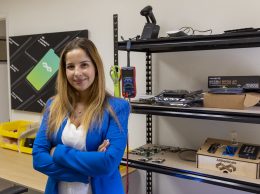Fardad draws $40M card in digital ad game
IN THIS ARTICLE
- Banking & Finance Topic
- Stephen Nellis Author
By Stephen Nellis Friday, September 14th, 2012
Farshad Fardad has raised $60 million and used $40 million of it to buy a Canadian firm in a bid to build a digital marketing conglomerate big enough to compete with the likes of ValueClick and the region’s other top names.
Fardad is CEO of Westlake Village-based GlobalWide Media, founded in 2007. In May, the company raised $60 million from Los Angeles-based private equity firm Endeavour Capital. The money helped GlobalWide buy Neverblue Media, a Vancouver, British Columbia-based online marketing company from its American parent company in a Chapter 11 bankruptcy auction.
GlobalWide declined to make Fardad, or anyone else, available to comment for this story. He’s known as a bright, friendly and articulate businessman with a financial background, but also a somewhat private family man who enjoys involvement in community groups. He is also very, very good at poker. Fardad has accumulated winnings of more than $100,000, according to data from Card Player magazine.
Fardad built up Hi-Speed Media, an email marketing company. He was president of the firm when it sold to ValueClick for $9.5 million in 2003. In 2008, ValueClick agreed to pay $2.9 million to settle charges brought by the FTC over Hi-Speed’s activities.
The FTC alleged Hi-Speed Media used deceptive emails, banner ads and pop-ups to drive consumers to its websites. The emails and ads promised consumers “free gifts” but then lured them “through a maze of expensive and burdensome third-party offers” that they were required to pay for out of pocket in order to receive the so-called gifts, according to an FTC news release about the settlement.
Hi-Speed and ValueClick did not admit to any wrongdoing, according to the terms of the settlement. A ValueClick spokesman confirmed that Fardad was still in charge of the Hi-Speed division when the company received the FTC complaint letter. ValueClick sold off Hi-Speed in 2010.
GlobalWide Media, meanwhile, has been quietly building its operations since 2007, when it announced a U.S.-based affiliate network. In affiliate marketing, so-called affiliates — sometimes bloggers, but also other kinds of Web-based publishers — aim to drive sales or lead generations in exchange for a commission. GlobalWide says it has steadily expanded that affiliate network to Europe and other markets.
GlobalWide was founded by Fardad and his brother, Frank. It is privately held and does not disclose its financial information. But it appears to be growing. In 2008, the company announced it was expanding its headquarters at 2945 Townsgate Road, Ste. 350. In 2009, the company said its founding brothers donated $1 million to Oaks Christian School in Westlake Village. In 2010, GlobalWide announced that it had added an online display advertising network to its businesses lineup.
The addition of the Canadian firm Neverblue, and its subsidiary AKMG, add depth to the company. Neverblue, which at one time claimed to have 50 employees, was part of Velo Holdings, a privately held firm that filed for Chapter 11 bankruptcy protections earlier this year.
Velo fell on hard times when federal regulators cracked down its online marketing practices, according a review of the bankruptcy documents by Dow Jones Daily Bankruptcy Review.
The newswire said that Velo would redirect consumers who had completed a purchase on a discount website to an offer for identity theft protection, asking them to enroll. Another Velo subsidiary asked only for the last four digits of a credit card number to enroll and begin charging the consumer, the report said. When the government started requiring customers to re-enter their full credit card number before being charged, Velo’s revenue dropped by almost $100 million, straining its finances and forcing its credit card processor, Chase Paymentech, to threaten to cut off its main revenue streams, according to Dow Jones.
Velo was a conglomerate of smaller online marketing companies, and it is unclear to what extent, if any, Neverblue and AKMG were involved those activities.
In May, Velo said it would put several of its component businesses up for sale, including Neverblue. Within days, Fardad and GlobalWide had closed a deal with Endeavour to raise $60 million in private equity, according to securities filings. GWM Holdings, the parent company of GlobalWide, was selected as the stalking horse bidder to place the first bid. It won Neverblue and AKMG for $39.2 million.
In a news release, Fardad said that Neverblue’s international footprint and mobile advertising expertise “complements our strengths in becoming the premier ‘one-stop’ solution for advertisers and publishers.”
Related Articles
 Friday, September 30th, 2022
Friday, September 30th, 2022
In the region and the nation, women get a tiny share of venture capital dollars
 Monday, September 19th, 2022
Monday, September 19th, 2022









